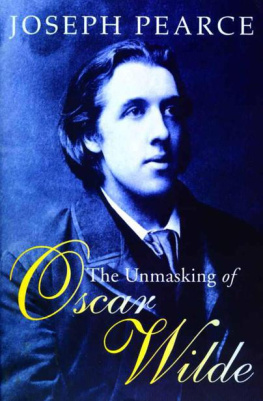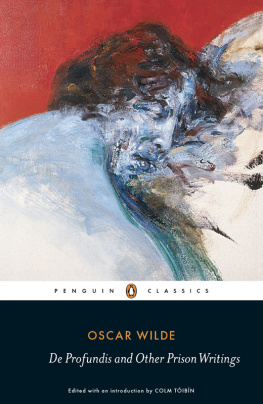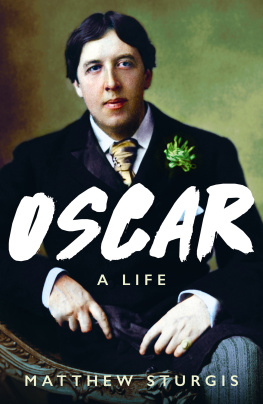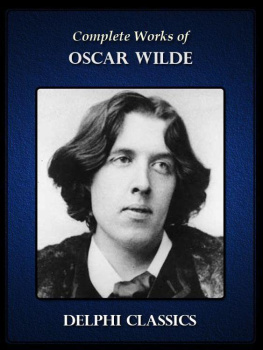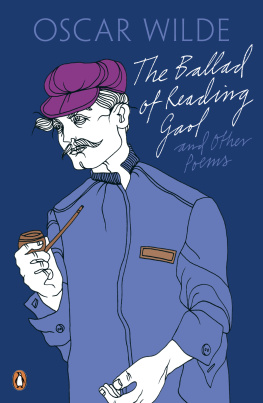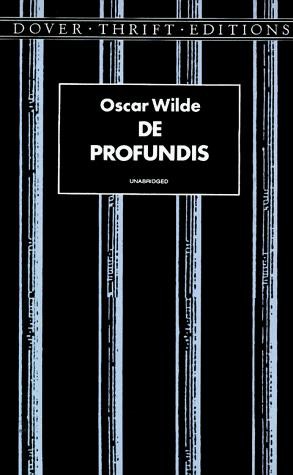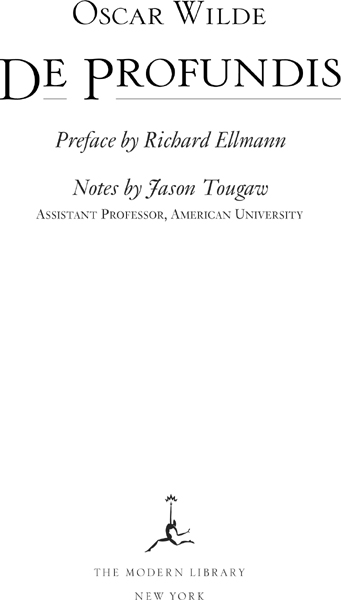Oscar Wilde
Oscar Wilde was born in Dublin in 1854. His father was a celebrated surgeon, his mother a supporter of Irish independence who presided over literary salons in Ireland and England. Although his brilliance as a classicist at Dublins Trinity College won him a scholarship to Magdalen College, Oxford, Wilde failed in his attempts at an academic career. Instead he set his sights on the literary and artistic worlds of London. Fusing the influences of Ruskin, the Pre-Raphaelites, Walter Pater, and Gautiers lart pour lart, he made himself the most visible manifestation of the Aesthetic movement; by 1881 a burlesque of Wilde provided the protagonist for the Gilbert and Sullivan operetta Patience. It was to exploit the popularity of the operetta, in fact, that the producer DOyly Carte underwrote Wildes immensely successful lecture tour of America. Married in 1884 to Constance Lloyd, Wilde worked briefly as a magazine editor while publishing poetry, plays, fairy tales, and essays.
The Picture of Dorian Gray was commissioned by J. M. Stoddardt, the Philadelphia publisher of Lippincotts Monthly Magazine. It appeared in the July 1890 issue and immediately gained a certain notoriety for being mawkish and nauseous, unclean, effeminate, and contaminating. When it was published as a book the following year, Wilde greatly revised and expanded the text, filling it out with a melodramatic subplot and adding a preface that defended his aesthetic philosophy. As for the books value as autobiography, Wilde noted in a letter that the main characters are in different ways reflections of him: Basil Hallward is what I think I am; Lord Henry what the world thinks me; Dorian what I would like to bein other ages, perhaps.
In the early nineties, Wilde was at the center of an artistic milieu characterized by The Yellow Book, the Rhymers Club, and the art of Aubrey Beardsley. He wrote a poetic drama, Salom, in French (1892), but it was banned in England; the play was published in book form with illustrations by Beardsley in 1894. Salom was produced in Paris in 1896.
However, Wilde did achieve success as a popular playwright, writing in rapid succession Lady Windermeres Fan, A Woman of No Importance, An Ideal Husband, and The Importance of Being Earnest. In 1895, two of his plays were on the London stage simultaneously, and he was acknowledged as a pivotal figure in English literary life, admired for his wit and eloquence.
Since at least the mid-1880s, Wilde had lived a sexual double life, and in 1893 he distanced himself from his family by taking rooms at the Savoy Hotel. He had by then embarked on a passionate relationship with the considerably younger Lord Alfred Douglas, the English translator of Salom whom he had met the year after he wrote The Picture of Dorian Gray. In March 1895, Wilde undertook a libel action against the Marquis of Queensberry, Lord Alfreds father, who had denounced Wilde as a somdomite [sic]. Wilde withdrew the suit following damaging cross-examination by the marquiss defense attorney, a former classmate of Wildes. (Question: Have you ever adored a young man madly? Answer: I have never given adoration to anybody except myself.) Shortly thereafter, Wilde was arrested for homosexual offenses and underwent two trials before being sentenced to hard labor at Wandsworth Prison and Reading Gaol. A long recriminatory letter to Douglas written while in prison was eventually published as De Profundis.
Released in 1897, Wilde left for France, calling himself Sebastian Melmoth, a name taken from the gothic novel Melmoth the Wanderer, written by Wildes great-uncle. A poem based on his prison experience, The Ballad of Reading Gaol, was published in 1898.
His health destroyed, and bankrupted by legal expenses, Wilde lived in Paris for three years, making a conversion to Roman Catholicism just before his death in November 1900. He is buried in the cemetery of Pre Lachaise.
C ONTENTS
Preface
by Richard Ellmann
De Profundis is a kind of dramatic monologue, which constantly questions and takes into account the silent recipients supposed responses. Given the place where it was written, Wilde might have been expected to confess his guilt. Instead he refuses to admit that his past conduct with young men was guilty, and declares that the laws by which he was condemned were unjust.who have no realization of Hamlets tragedy, being the little cups that can hold so much and no more.
The main theme of self-recrimination is that he did not break with Bosie. But his letter is an attempt to restore relations. And while he admits to weakness, he explains the weakness as due to his affection, good nature, aversion to scenes, incapacity to bear resentment, and desire to keep life comely by ignoring what he considered trifles. His weakness was strength. The gods, he has discovered, make instruments to plague us out of our virtues as well as our vices.
Wilde acknowledges that along with good qualities, he was the spendthrift of my own genius. But he passes quickly over this defect, and those that attend it. Much of De Profundis is an elegy for lost greatness. As he whips his own image, he cannot withhold his admiration for what that image was. Elegy generates eulogy. He heightens the pinnacle from which he has fallen:
I was a man who stood in symbolic relations to the art and culture of my age. I had realised this for myself at the very dawn of my manhood, and had forced my age to realise it afterwards. Byron was a symbolic figure, but his relations were to the passion of his age and its weariness of passion. Mine were to something more noble, more permanent, of more vital issue, of larger scope.
The gods had given me almost everything. I had genius, a distinguished name, high social position, brilliancy, intellectual daring: I made art a philosophy, and philosophy an art: I altered the minds of men and the colours of things: there was nothing I said or did that did not make people wonder: I took the drama, the most objective form known to art, and made it as personal a mode of expression as the lyric or the sonnet, at the same time that I widened its range and enriched its characterisation: drama, novel, poem in rhyme, poem in prose, subtle or fantastic dialogue, whatever I touched I made beautiful in a new mode of beauty: to truth itself I gave what is false no less than what is true as its rightful province, and showed that the false and the true are merely forms of intellectual existence. I treated Art as the supreme reality, and life as a mere mode of fiction: I awoke the imagination of mycentury so that it created myth and legend around me: I summed up all systems in a phrase, and all existence in an epigram.
In prison, he says, he has at least learned humility. Humility is a slippery term in De Profundis. Wildes only definition of it there is the frank acceptance of all experience. The pursuit of pleasure must take into account the advent of sorrow. But in a way he has always known this. Still, much of the folderol of personality has receded in importance: as a young man he had often praised poses and masks; now he says, Those who want a mask have to wear it. In America he announced that the secret of life is art. Now he had found that the secret of life is suffering.


